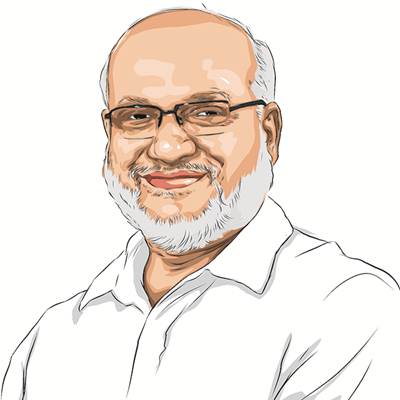Opinion M A Baby writes: Communists would be happy with atmanirbharta. GST reforms don’t achieve it
The Prime Minister’s ‘Diwali gift’ is intended primarily for foreign and large domestic corporations, not ordinary people
 Taken as a whole, the policies announced by the Prime Minister neither promote self-reliance nor benefit ordinary people
Taken as a whole, the policies announced by the Prime Minister neither promote self-reliance nor benefit ordinary people It is heartening to see the Prime Minister take the time to address the nation on the long-demanded reform of the GST structure. He described his announcement as a “Diwali gift”, referring to the festival of lights that is meant to bring brightness into people’s lives. However, one is left wondering how much light this reform will actually bring into the lives of ordinary people.
We must view the Prime Minister’s statement in the context of his recent emphasis on atmanirbharta, or self-reliance. None would be happier than we communists if the country were to achieve genuine self-reliance, not only in the economy but in all aspects of national life. The facts on the ground, however, give us little reason for such optimism. Critics point to the timing of the GST reform: It was announced now, rather than earlier, to cater to US President Donald Trump’s demands for a simpler tax structure. Was it, then, the pressure of tariffs that forced this announcement?
The current state of the Indian economy, which is in deep crisis, raises many such apprehensions. The Union cabinet has approved several concessions for both foreign and domestic corporations in a vain attempt to revive growth. It is not that corporations lack capital to invest. Indian corporations are holding Rs 10.7 lakh crore in cash without investing, while foreign companies have stalled projects worth Rs 2 lakh crore in the first quarter of 2025-26 — the highest since 2010, according to data from the Centre for Monitoring Indian Economy (CMIE). A mere reduction in taxes will not induce them to invest or revive the economy. Many corporations remain reluctant to invest because people lack the capacity to buy. Real wages and purchasing power must be increased if the economy is to recover.
Industrial growth slowed to a 10-month low of 1.5 per cent in June 2025, with the mining sector experiencing its sharpest decline in 58 months. The government’s Periodic Labour Force Survey (PLFS) for July 2025 places India’s unemployment rate at 5.2 per cent, while the CMIE reports a higher rate of 7.0 per cent. CMIE data further show that 44.5 per cent of Indians aged 20-24 are unemployed, many of them graduates or postgraduates. Employment in manufacturing has also fallen, declining from 12.8 per cent in 2012 to 11.5 per cent in 2024.
The Quarterly Bulletin of Unincorporated Sector Enterprises (QBUSE) reveals that although the number of establishments rose to 79.4 million in April–June 2025, the number of workers declined to 128.6 million, down from 131.3 million in January-March. This indicates that even a marginal increase in establishments is failing to generate jobs; instead, it is accompanied by net job losses.
India’s working-age population is projected to rise by at least 12 million annually until 2030. To absorb this growth, around 9 million new jobs need to be created each year. The impact of US tariff terrorism will fall most heavily on labour-intensive MSMEs, particularly in the textile sector. With many of these businesses under threat, closures could worsen already high unemployment levels. No country can aspire to true self-reliance unless it harnesses the strength of its youth in productive employment.
Self-reliance and economic revival can only be achieved through trade deals that genuinely benefit our farmers and MSME entrepreneurs, and ensure large-scale employment generation. Before rushing into a spree of FTA signings, the government must consult a wide range of stakeholders and carefully assess whether these agreements truly serve the interests of the people. The current haste to conclude trade deals is resulting in the surrender of national interests in critical sectors such as dairy, agriculture, defence, pharmaceuticals, and finance. In its attempt to wriggle out of US-imposed tariffs, the central government is yielding to American pressure, opening multiple sectors of the economy to external exploitation.
This trend was evident during the Monsoon Session of Parliament, where several bills harmful to national interests and the cause of self-reliance were passed. Among them was the Mines and Minerals (Development and Regulation) Amendment Bill, which permits foreign players to exploit India’s crucial mineral resources. The eagerness of BJP governments to grant foreign and private corporations access to mineral-rich lands is also a key motive behind the eviction of tribal communities, as seen in Assam and Chhattisgarh.
In addition, the government notified amendments to the Indian Insurance Companies (Foreign Investment) Rules, 2015, changes that will have far-reaching consequences for policyholders, the national economy, and the public at large. These amendments allow the commercial priorities of foreign investors to override public welfare objectives, undermining both financial stability and social security. They also open the door to predatory takeovers, eroding national control over vital resources.
It is in this context that we must view the GST reforms proposed by the government. The reduction of GST on goods and services consumed by ordinary people, including insurance policies, is a welcome step. However, it must be ensured that the benefits of this reduction actually reach consumers rather than being cornered by corporations. Progressive taxation should remain the guiding policy.
True atmanirbharta demands that every household, every worker, and every region of the country is empowered to stand on its own feet. Yet, the government’s approach points in the opposite direction. Consider the states’ position. Many welcomed GST reform in principle but warned that they would suffer significant revenue losses as a result. They raised the entirely legitimate demand for compensation from the Union government. Instead of responding with fairness, the Centre has resisted, effectively forcing states into financial dependency. This centralising tendency is part of a broader strategy to weaken the federal structure by making states, particularly those ruled by Opposition parties, reliant on financial transfers from New Delhi. In this way, finance becomes a weapon of political control. Far from fostering atmanirbharta, this approach entrenches dependence and undermines the very fabric of Indian federalism.
Taken as a whole, the policies announced by the Prime Minister neither promote self-reliance nor benefit ordinary people. The so-called “gift” announced is not meant for them, nor for the state governments. It is intended primarily for foreign and large domestic corporations. For a vast section of the population, Diwali remains just another Amavasya (new moon day), with government policies failing to bring light into their lives. It is only the rich who are celebrating.
The writer is general secretary, CPI(M)





